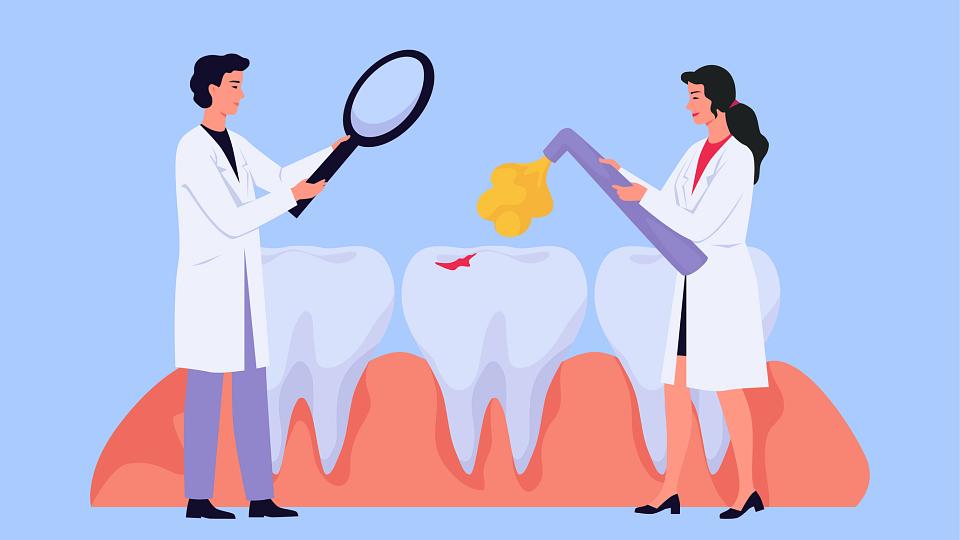
The Perils of Sensitive Teeth
It happens to everyone when you least expect it—a quick swig of hot chocolate after coming in from the cold and ouch! Your teeth react to the temperature change as if you had been chewing on tin foil.
Statistics show that one out of every eight Americans suffer from teeth sensitivity—otherwise known as dentinal hypersensitivity. But not many of us talk to a dentist about it.
What causes tooth sensitivity?
The main culprit for sensitivity is the tooth's enamel wearing down. "A very common cause of tooth sensitivity is the exposure of dentin and cementum caused by loss of soft tissue support surrounding the teeth, or recession of the gum tissue," says James Keddington, DDS, an assistant professor and section head of dental conservation and restoration at the University of Utah School of Dentistry. "Some people have inherently sensitive teeth, and even with the most careful attention to prevention of all of these factors, the symptoms may remain."
Is tooth sensitivity preventable?
Proper oral hygiene is your best bet against developing sensitive teeth. This includes:
- Floss daily
- Brush your teeth at least twice per day
- Fluoride rinse once a day or brush your teeth with fluoride toothpaste twice per day
Some basic lifestyle changes can help as well, including:
- Switch to a soft-bristled brush and brush with a lighter touch.
- Avoid chewing ice.
- Don’t brush immediately following a snack or a meal that includes acidic foods. Instead, brush your teeth beforehand, then rinse your mouth with water following the meal.
A common list of foods and drinks that are acidic include citrus fruits and juices, sodas, energy drinks, sports drinks, candy (especially sour candy), chips, ice cream, and sweeteners placed in coffees or teas. Keddington advises people to limit how often we consume these foods, especially soda.
"Each sip leads to increased demineralization," he says. "If a person has to have their food or drink, they should eat it or drink it and finish, as opposed to nursing it for a prolonged time."
Can tooth sensitivity be controlled or reversed?
Our teeth are in a constant state of demineralization (eating, drinking, bleaching, etc.) and remineralization (salvation, fluoride application, oral hygiene).
"Tooth demineralization takes seconds to begin, while tooth remineralization can take hours," Keddington says. "When demineralization is overtaking remineralization, we risk sensitivity and damage to the tooth structure, especially when the acidic foods and drinks contain refined sugar."
The first step is to determine the "root" cause of sensitive teeth. A visit to the dentist will rule out a cavity or abscessed tooth.
"If a person is dealing with temporary tooth sensitivity, time, saliva, and the removal of bacterial plaque with floss, a toothbrush, and fluoride toothpaste should be enough," Keddington says.
He also suggests switching to a toothpaste designed to eliminate tooth sensitivity over time. Be sure to select brands that have fluoride (a remineralizing agent) and potassium nitrate (a desensitizing agent).
What about tooth whitening kits?
Tooth whitening kits have been known to cause tooth sensitivity. Typically, though, it is a reversible sensitivity.
"While using hydrogen peroxide or carbamide peroxide to whiten or bleach teeth, the effect of the whitening agent does slightly demineralize the enamel of the tooth," Keddington says. "If a person has exposed cementum (the hard tooth structure covering the root) or the dentin (the hard tooth structure beneath the enamel or cementum), the sensitivity potential increases. But this demineralization of the tooth structure is temporary, and with a normal salivary flow rate, the teeth begin to remineralize again."
If people experience sensitivity while whitening their teeth, they should stop the process. Often, the lower the concentration of hydrogen peroxide, the less sensitivity is experienced, but the bleaching process will take longer. Many of the professional strength bleaching agents will have added ingredients such as fluoride and potassium nitrate, which help combat tooth sensitivity.
If you have questions or concerns about tooth whitening, consult with a dental professional.
5 Health Concerns Associated with Gum Disease You May Not Know About
Daniel Thunell, DMD, board-certified periodontist, explains how inflammation in your mouth could impact your long-term wellness—and what you can do to prevent it.
How to Access Affordable Dental Care
Dental health is crucial, but not always affordable for all budgets. James Bekker, DMD, from University of Utah School of Dentistry, offers an insider's guide to finding and utilizing low-cost dental services.
Understanding Tooth Sensitivity and How to Manage It
Feeling discomfort when eating hot or cold foods? Tooth sensitivity can be more than just a minor annoyance—it could signal a deeper issue. David Okano, MD, breaks down what different...







